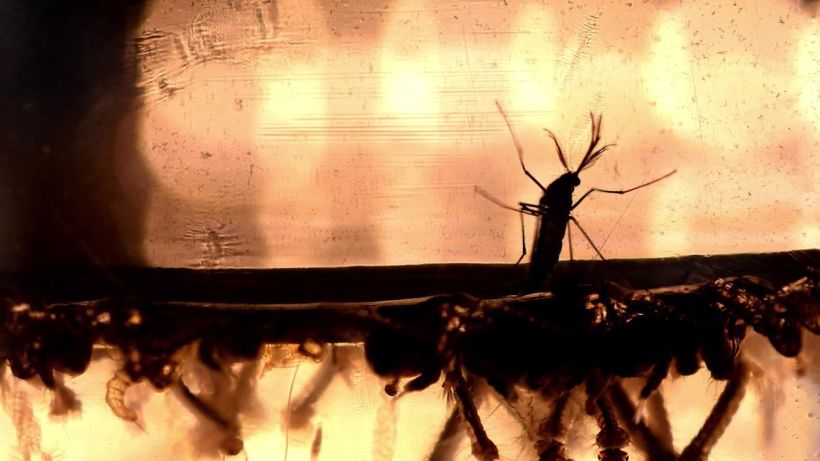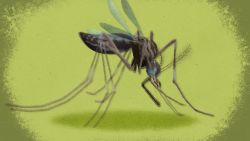Story highlights
Study shows male and non-pregnant monkeys could not be reinfected with Zika
But pregnant monkeys stayed infected 30 to 70 days longer
Researchers worry that Zika could be passed back from fetus to mother
Once you’ve had Zika, can you get it again? Scientists don’t think so, but it’s never been proved. Researchers from the University of Wisconsin say they are one step closer to answering that question after studying how the virus affects rhesus macaque monkeys.
“It’s important for us to show in a lab setting what people have expected in humans: that you clear infection by the Zika virus within a week, and you are protected from future infections by the same virus,” said Emma Mohr, a pediatric infectious disease fellow at UW-Madison and one of the lead authors of the study, published in Nature.
Eight animals, two of whom were pregnant, were infected with the Asian strain of Zika, currently circulating in much of Central and South American and the Caribbean. It’s the strain associated with serious birth defects, such as microcephaly, and an increased risk for Guillain-Barré, a disorder in which the body’s own immune system attacks nerve cells.
The monkeys that were not pregnant showed that the virus stayed active in blood for up to 10 days and lasted up to 17 days in urine and saliva. Then the virus appeared to go away and stay away, even after the animals were reinfected with the same strain 10 weeks later.
“When we gave the same virus back to the animals, there was no sign of disease in their blood,” said biologist Dawn Dudley, another author of the study. “We saw complete protection for up to 28 days following the exposure.”
“And it goes down to zero levels or at least below our threshold of detection,” added co-author David O’Connor, chairman of the Global Infectious Disease division of the Wisconsin National Primate Research Center.
O’Connor and his team had seen similar results earlier in the year when they infected another group of monkeys with the African strain and then introduced the Asian variation.
“It’s pretty solid evidence that the initial infection provides some protection from reinfection from either strain,” he said. “The reason I’m hedging that a little bit is because we don’t know how long. It could be a year; it could be three years, five years. It could be lifetime immunity. We just don’t know right now, and the studies are so new that we can’t have that data yet.”
But there were also some startling findings. The virus appears to stay longer in pregnant monkeys, much longer than the 10-day average in males and non-pregnant monkeys. In results published online in an open research portal, O’Connor’s group found that the virus lasted approximately 30 days in one pregnant female and 75 in another.
“In this latest study, we infected two females in their third trimester,” O’Connor said. “In one animal, the infection wasn’t extended at all, and in the other, the amount of virus in the blood stayed relatively constant out to 50 days.”
O’Connor says these data suggest that every pregnancy is different in terms of how long the virus persists, at least in monkeys.
“Our running hypothesis is, we’re actually seeing the virus being given from the fetus back into the mother,” O’Connor said. “And we believe that the longer this happens, the greater the probability of fetus abnormality there will be. Again, that’s a hypothesis right now, but that’s what we’re currently testing.”
O’Connor says his findings are particularly significant in light of a recent case report published in the New England Journal of Medicine that describes what happened to a 33-year-old Finnish woman who developed Zika while pregnant.
“She had the same thing,” he explained, “where the virus persisted until the woman terminated her pregnancy, at which point, the virus went completely away. So that’s another reason we believe this might actually be a virus that is coming back into the mother from the fetus and not just the mother being infected and not being able to fight it off herself.”

O’Connor’s group is using a strain of Zika that came from French Polynesia, site of the first large outbreak of Zika in humans. Another research group at the UC Davis primate research center is also infecting three pregnant macaques but using a sub-strain of the virus from a patient in Brazil. And their study involves a unique twist.
“In addition to infecting the pregnant monkey, we are also infecting the fetus via the amniotic fluid,” said Dr. Koen Van Rompay, Zika project leader at the center. “To make absolutely sure that the infant has Zika.”
Just one week after the mothers were infected, one of the fetuses died, and an autopsy showed massive amounts of the virus in bodily tissues. The other two monkeys are still advancing in their pregnancies and at this time show no evidence of the virus in their blood.
Join the conversation
“But we do see large amounts of the virus in amniotic fluids,” Van Rompay said. “What all of this means, it’s just too soon to tell. And you have to remember, these are studies in just a few animals. We may need to replicate in a larger group.”
Van Rompay and his colleagues hope to do just that this fall, when breeding season for the rhesus macaque is at its peak.
“Our hope is that once we have a better understanding of the animal model of the Zika virus, we can test multiple strategies to combat the virus in a very short period of time, using a very small number of monkeys,” Van Rompay said. “This can provide the information doctors need to start clinical trials in humans.”


















